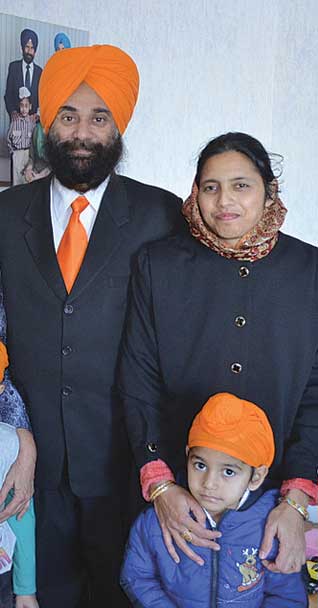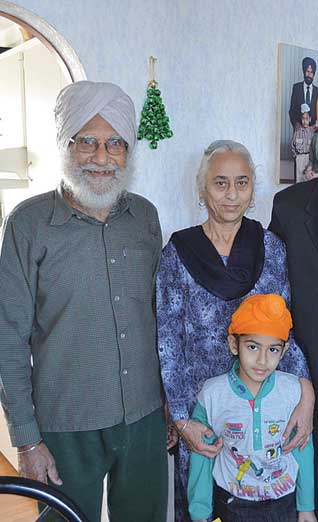
Above: Harbinder Singh & Shaminder Kaur, with their younger son, Prabhsimarjit Singh. Below: Grandparents Harbans Singh & Harbans Kaur, with grandson Harsimarjit Singh.

People
Go West, Young Man!
Sikh-Canadian Family's Farming (Ad)venture in Manitoba
DANIEL WINTERS
The family of Harbinder Singh Khosa, 47 has followed an age-old mantra for those looking to make a fresh start in a land of plenty.
They’ve come west.
On a quarter section of rolling grain land just east of Oak Lake, the Sikh family that spans three generations is keen to put down roots. They’ve lived in Toronto for nearly two decades. But about 18 months ago, they decided to try farming -- not for the money -- but more to experience the “fun” of growing food.
“I am trucking right now, but maybe next year we will start farming as well,” said Harbinder Singh.
All vegetarians, they are excited about growing their own food. This past summer they planted a vegetable garden, but for now have opted to rent the rest of their acres to a neighbour until they can buy enough machinery to grow their own crops.
An engineer by training and an experienced diesel mechanic, Harbinder is planning to open a repair shop on the property, which lies right next to the Trans-Canada Highway.
But right now, he’s been busy replacing the block on one of the three semi-trailers parked in the yard.
With no roof overhead, working in God’s Great Garage doesn’t bother him -- so long as it doesn’t get any colder than -8 C. Still, it’s not much fun when tools or stray bolts fall in the snow, he said.
Harbans Singh is the family patriarch. A schoolmaster in his native Punjab, the spry 78-year-old with twinkling eyes and a ready smile credits a vegetarian diet for his excellent health.
“I can take meat and eggs, but I find that I don’t need it,” he said, adding that the Sikh religion doesn’t prohibit meat consumption.
In Punjab, most farmers grow crop rotations of wheat-pulse-rice, but with no prior experience at farming, they plan to start out with the same crops that their neighbours have good success growing, he said.
He is looking forward to bringing his other son, Parmpal, 44, over from India to help out.
“One and one makes 11,” he joked, meaning that two brothers working together can accomplish as much as 11 men.
Most people are unfamiliar with the Sikh religion, but Harbans does his best to explain the salient features at every opportunity. Monotheism, the belief in an all-powerful God, is the core of the religion, followed by a firm belief in the universal equality of all humans.
“The main principle is to work hard at honest work. Second is share with others, and the third is to remember God,” said Harbans.
Sikhs make up only two per cent of the population of India, but under British rule, they made up a large proportion of the military due to their “boldness and bravery,” he said.
Harbinder hopes that their farming venture is a success and that his two sons, aged four and five, currently enrolled in the local school, may one day be part of an expanded family operation.
But for now, he’s pleased to give the boys the opportunity to run and play outdoors in the farm’s wide-open spaces.
The latest Statistic Canada report, entitled “Get to know Canadian farmers and their families,” states that of the roughly 45,000 immigrant farmers in Canada that make up about seven per cent of the total farming population, about eight per cent listed their mother tongue as Punjabi.
In comparison, the most common mother tongues for Canada’s immigrant farm population were English (34.5 per cent), Dutch (17.8 per cent), German (16.7 per cent), and French (3.8 per cent).
According to numbers gathered in 2011, of the almost 550,000 immigrants from India, only 3,785 of them became farmers. What’s more, most of them settled in the balmy climes of British Columbia.
Christianity was the most frequently reported religious affiliation for the immigrant farm population in each province, except for British Columbia where Sikh was the most frequently reported religion.
Of the immigrant farm population reporting a religious affiliation, the most frequently reported religions were Christian (Roman Catholic and others - 37.9) and Sikh (9.9 per cent).
[Courtesy: Manitoba Co-operator. Edited for sikhchic.com]
December 6, 2013
Conversation about this article
1: Baldev Singh (Bradford, United Kingdom), December 09, 2013, 7:27 AM.
I simply love these stories of Sikhs moving somewhere new and making it big! And I mean big! Every Sikh family has a tale to tell and these tales would be even more awesome without any 'Hindu' practices and 'Hindu' party politics! Let's all be Sikhs, 'Asians' or 'Indians' or even 'Punjabis' and enjoy life and success even more!


